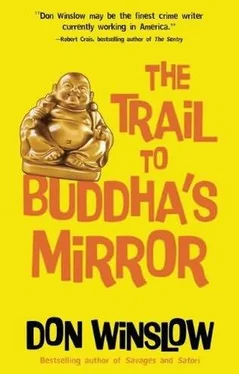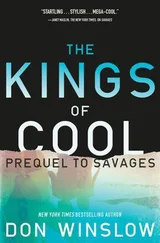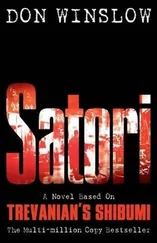Don Winslow - The Trail to Buddha_s Mirror
Здесь есть возможность читать онлайн «Don Winslow - The Trail to Buddha_s Mirror» весь текст электронной книги совершенно бесплатно (целиком полную версию без сокращений). В некоторых случаях можно слушать аудио, скачать через торрент в формате fb2 и присутствует краткое содержание. Жанр: Триллер, на английском языке. Описание произведения, (предисловие) а так же отзывы посетителей доступны на портале библиотеки ЛибКат.
- Название:The Trail to Buddha_s Mirror
- Автор:
- Жанр:
- Год:неизвестен
- ISBN:нет данных
- Рейтинг книги:3 / 5. Голосов: 1
-
Избранное:Добавить в избранное
- Отзывы:
-
Ваша оценка:
- 60
- 1
- 2
- 3
- 4
- 5
The Trail to Buddha_s Mirror: краткое содержание, описание и аннотация
Предлагаем к чтению аннотацию, описание, краткое содержание или предисловие (зависит от того, что написал сам автор книги «The Trail to Buddha_s Mirror»). Если вы не нашли необходимую информацию о книге — напишите в комментариях, мы постараемся отыскать её.
The Trail to Buddha_s Mirror — читать онлайн бесплатно полную книгу (весь текст) целиком
Ниже представлен текст книги, разбитый по страницам. Система сохранения места последней прочитанной страницы, позволяет с удобством читать онлайн бесплатно книгу «The Trail to Buddha_s Mirror», без необходимости каждый раз заново искать на чём Вы остановились. Поставьте закладку, и сможете в любой момент перейти на страницу, на которой закончили чтение.
Интервал:
Закладка:
The Chairman’s Great Leap Forward started in 1957, after an unusually fine harvest. But the Chairman wasn’t satisfied with the mere production of food; society had to be recorded along less “individualistic” and “selfish” lines. Collectivization of all the land was accelerated. The entire rural population was organized into production teams. No peasant dared own so much individual property as a chicken. Worse still, by year’s end, over 300,000 “stinking intellectuals,” including the best economists and scientists, had been labeled “rightists” and shipped off to prison camps.
So when the crisis hit, all the experts who might have controlled it were gone, and no one else dared speak. The Chairman set quotas for grain production, and the new commune managers met them all-on paper. The Chairman looked at the figures and boasted that the new order-the new China-was working just as he said it would, and commanded in the name of “the people” that collectivization be speeded up. Then he set higher quotas, and the people met them-on paper.
Figures may not lie, but the people who write them do, and the Party cadres who reported the figures did just that. They were afraid to be labeled “defeatists,” so they reported victory. They ordered fields to lie fallow to avoid a glut of grain. They took peasants from the fields and set them to building warehouses to hold all the grain that would be harvested. On paper.
But in the fields and the paddies it was a different story, for less than half the grain the figures claimed was actually harvested, and even less was processed. Crops rotted in the fields while the peasants built useless warehouses, fields were not tended while the peasants were sent to work in “backyard steel mills” to help with industrialization. Collectivization was chaos. Urban cadres who knew nothing about agriculture gave idiotic and contradictory orders to the peasants. The already fragile transportation system broke down completely, and precious farm tools and invaluable fertilizers sat in stalled railroad cars or were “lost” entirely. Grain production dropped over sixty percent, and while the cadres dutifully checked nonexistent grain into nonexistent warehouses, the Chairman shipped the real grain to the Soviets to repay the debts of industrialization.
The experts who might have helped-the Western-trained agronomists, economists, statisticians, and biochemists-were in prison for the very crime of being Western-trained experts. The few who had escaped that fate were silenced the moment they spoke the truth that the Great Leap Forward was a sham, a tragic fiasco launched by a madman. The emperor had no clothes and the people had no food.
The people starved. Twenty million people starved to death in three years. Many more died of malnutrition-related diseases in the years following. And more than half of the dead were children.
That was our “New China,” Xao thought, a land where we starved our children.
He could never shut his eyes without the sights coming back to him. His nightmares were not of the war with all its various horrors, but of those years, of the emaciated mothers-too weak to walk-who lay beside the road, trying to feed rice husks to babies who were already dead. Or of the children begging him for food, staggering toward his staff car on spindly legs, their rheumy eyes asking him questions for which he had no answers. If you want to eat, go see Xao Xiyang.
I will see you in hell, old friend. You and I will both be there, because I, too, posed for the cameras in the “model villages,” those sham communes that received the money, the fertilizers, and the pesticides. I, too, posed beside the huge piles of grain, the fattened hogs, and the smiling peasants with fat and rosy-cheeked children. I, too, congratulated their leaders and held them up as an example to the rest, even though I also knew that their figures were lies. Even with all their resources, they had to lie. And the rest of the country had to live up to the lie, and send out more grain, and starve all the more. Oh, I will join you in hell, old friend.
Finally the slaughter became too much for some of the higher Party members, who braved the Chairman’s wrath and forced him to put a check on the insanity. Collectivization was modified and slowed down. Some land was freed up to private agriculture. A few of the experts who had survived the purge were returned to their posts. A slow, painful recovery began as the professionals took over from the politicians and pragmatism took precedence over ideology. By 1965, food production reached its normal levels. There was still hunger, but starvation disappeared. And the Chairman sulked and bided his time.
You gave us barely a year, old friend. One year of peace and prosperity and you started it off again. Chaos: the Great Proletarian Cultural Revolution.
Xao chuckled at the sheer insidious brilliance of it. The Chairman succeeded in defining success as treason. The experts, the careful planners, the scientists, the intellectuals, the prudent small farmers were all condemned as “capitalist roaders.” The proof? Their very success! The wonderful inverted logic! As if to say that it was impossible to succeed within the system, and that therefore those who did succeed did so outside the system, via the “capitalist road.” They were traitors, and it was their treason that sabotaged the system and made it not work! It was an argument only a child could accept, and it was to children that the Chairman argued it.
In doing so he released a torrent of pent-up adolescent rage. In a society in which repressed youth were taught to respect their elders, the Chairman urged them to overthrow those same elders. With the uncanny radar of the psychopath, he targeted the teachers first. Those Confucian demigods, so long used to blind obedience, awoke one morning to find themselves ridiculed in “big-character posters,” confronted by formerly docile students demanding a voice in the classroom. Granted that voice, the students denounced their teachers for not being “pure” enough, for not being “red” enough, for not loving the Chairman enough. In the end, the teachers were accused of being educated, and once that lunacy was accepted, the floodgates opened.
Officials were denounced for planning, scientists for doing research, journalists for writing, intellectuals for thinking… farmers for growing food. In the “permanent revolution,” everything by definition was to be turned upside down. The only thing that mattered was political fervor. Fervor for what? For the Chairman’s thought. And what did the Chairman think? He thought there should be political fervor.
So success became sabotage, planning became plotting, education became ignorance. In this upside-down world, children denounced their parents, agricultural experts carried buckets of shit, illiterate peasants “wrote” railroad timetables.
And you, old friend, became an emperor. “All is chaos under the heavens,” you wrote, “and the situation is excellent.” The Emperor of Chaos.
Xao lit another cigarette. He remembered when the children had come for him. Those Red Guards, swollen with pride, waving their red banners and carrying the red books. They had come to denounce him as a reactionary.
His immediate superior had opened the door to the mob and welcomed them in, praising them, and thanking them for their true insights into “Mao Thought.” It wasn’t unusual; many of the officials had agreed to denounce and be denounced. Betray your subordinates to buy time, betray your superiors to move up. Anything to buy time, anything to survive, because this time they knew that they must survive. However many didn’t make it-and many didn’t-some of the professionals must survive to rebuild. So he had felt no anger when his friend and trusted superior had denounced him to the mob as a Western-influenced capitalist-roader. He was sitting calmly in his office, smoking a cigarette, when the local Red Guard burst in and tied his hands behind his back. They put a huge dunce cap on his head and marched him through the streets, where the mob threw rotten vegetables at him, spat on him, and screamed insults in his face.
Читать дальшеИнтервал:
Закладка:
Похожие книги на «The Trail to Buddha_s Mirror»
Представляем Вашему вниманию похожие книги на «The Trail to Buddha_s Mirror» списком для выбора. Мы отобрали схожую по названию и смыслу литературу в надежде предоставить читателям больше вариантов отыскать новые, интересные, ещё непрочитанные произведения.
Обсуждение, отзывы о книге «The Trail to Buddha_s Mirror» и просто собственные мнения читателей. Оставьте ваши комментарии, напишите, что Вы думаете о произведении, его смысле или главных героях. Укажите что конкретно понравилось, а что нет, и почему Вы так считаете.












